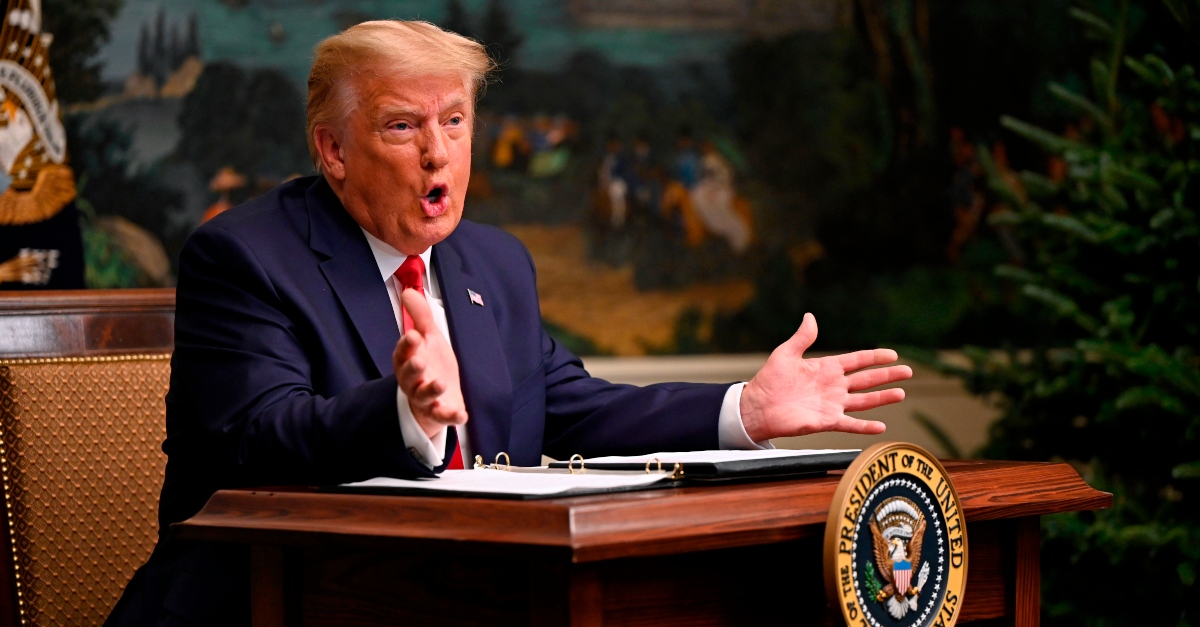
Soon-to-be-former President Donald Trump has time and again touted his stacking of the judiciary with hundreds of lifetime appointments, but those judges have resoundingly rejected meritless post-election lawsuits brought by Trump and his allies. That happened again in Wisconsin federal court.
“This is an extraordinary case,” U.S. District Judge Brett Ludwig wrote in a 23-page ruling on Saturday, italicizing the word repeatedly in his ruling. “A sitting president who did not prevail in his bid for reelection has asked for federal court help in setting aside the popular vote based on disputed issues of election administration, issues he plainly could have raised before the vote occurred. This Court has allowed plaintiff the chance to make his case and he has lost on the merits.”
“In his reply brief, plaintiff ‘asks that the Rule of Law be followed,'” Ludwig observed.
“It has been,” he concluded.
The decision was no surprise to those who kept track of the judge’s remarks during court proceedings on Thursday, when he called Trump’s request to declare Wisconsin’s elections void “incredible.”
Trump’s lawyers had previously asked him to “remand” Wisconsin’s elections to the state Legislature and declare the lame-duck the actual winner—an entirely different request for relief that the judge said he found “odd.” His remarks before daylong oral arguments this week tried to tamp down on the bread and circuit of the post-election season.
“What I’d like to do is limit the political theater as much as we can,” Ludwig said at the time. “What I’m trying to do is apply the law to the facts here in the most efficient way.”
Ludwig noted that this would be a tall order given the nature of Trump’s lawsuit.
“It’s not lost on me that this is a political case…and that the relief that’s been requested if that relief were granted, this would be a most remarkable proceeding and probably the most remarkable ruling in the history of this court or the federal judiciary.”
Like many of Trump’s attorneys, Bill Bock of the firm Kroger Gardis & Regas LLP did not allege fraud. Instead, he raised hackles about Wisconsin’s use of ballot drop boxes and argued that the election should be nullified because of their use.
“They’re essential to protect the integrity of the ballot,” Bock said, referring to state election code.
A sports litigator who once served as the lead attorney for the United States Anti-Doping Agency, Bock likened the issue to Olympic athletes being stripped of their medals for using performance-enhancing drugs.
“The ramifications for the republic are profound,” Bock said.
Pushing the doping analogy further, Bock asked the judge to call foul—or else: “They will, as they did in this case, step well over the line.”
When not offering sports analogies, Bock forayed into Supreme Court history (but with unfortunate results). He claimed that while declaring a state’s election void by federal judicial fiat would be unpopular, it would stand the test of history like Brown v. Board of Education and Loving v. Virginia.
The NAACP skewered Trump’s counsel for those “patently offensive” comparisons, and they noted that the president has targeted communities with the greatest number of Black voters state-by-state. In Wisconsin, Trump focused on Milwaukee and Dane Counties.
Ludwig is hardly alone in stubbornly maintaining independence as a Trump-appointee hearing the post-election litigation of the man who appointed him.
U.S. Circuit Judge Stephanos Bibas authored the Third Circuit’s blistering ruling rejecting the Trump campaign’s effort to overturn Pennsylvania’s election.
“Free, fair elections are the lifeblood of our democracy,” Bibas wrote late last month, dismissing a suit argued in a lower court by Rudy Giuliani. “Charges of unfairness are serious. But calling an election unfair does not make it so. Charges require specific allegations and then proof. We have neither here.”
That ruling quoted Giuliani telling a federal judge: “This is not a fraud case,” and it stated a fundamental concept of democratic governance.
“Voters, not lawyers, choose the President,” the Third Circuit’s opinion stated. “Ballots, not briefs, decide elections.”
On Nov. 19, Trump-appointed U.S. District Judge Steven Grimberg similarly rejected a request for Lin Wood to override the people’s choice in Georgia.
“To halt the certification at literally the 11th hour would breed confusion and disenfranchisement that I find have no basis in fact and law,” Grimberg declared from the bench at the time.
Trump was not a plaintiff in that case, but Wood’s attorney Ray Stallings Smith III represented the outgoing president’s failed campaign.
The Supreme Court also declined to hear a case brought by pro-Trump Rep. Mike Kelly (R-Pa.) without bothering to comment on why. We’ll never know how the three justices that Trump appointees viewed that case, but we do know that every member of that trio—Justices Amy Coney Barrett, Brett Kavanaugh, and Neil Gorsuch—declined to hear indicted Texas Attorney General Ken Paxton’s lawsuit supported by Trump and a stunning number of Republican state AGs and members of Congress.
[Image via ANDREW CABALLERO-REYNOLDS_AFP via Getty Images]